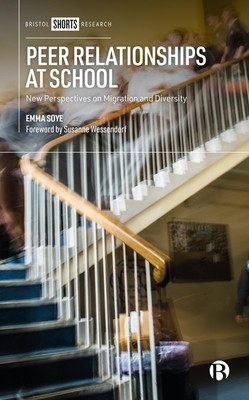
- We will send in 10–14 business days.
- Author: Emma Soye
- Publisher: Bristol University Press
- ISBN-10: 1529235758
- ISBN-13: 9781529235753
- Format: 12.7 x 20.3 x 1.1 cm, hardcover
- Language: English
- SAVE -10% with code: EXTRA
Reviews
Description
Available Open Access digitally under CC-BY-NC-ND licence. Migration studies are increasingly recognising that ethno-national frameworks are inadequate when examining the complexity of social life in contexts of migration and diversity. Drawing on ethnographic research from the Horizon 2020 project 'RefugeesWellSchool', this book examines social dynamics in two UK secondary schools, considering a range of factors including migration status, race and ethnicity and language and religion. The book offers a new framework for analysis and challenges culturalist perspectives on issues of social cohesion by highlighting the impact of socioeconomic inequality on peer relationships. Using Martin Buber's relational model, the book explores the interplay of 'I-It' boundary-making with transformative 'I-Thou' encounters, characterised by mutual vulnerability and recognition of the uniqueness of the 'other'. The author provides a detailed and optimistic view of the dynamics of diversity in everyday life, offering valuable insights for social policy and practice.
EXTRA 10 % discount with code: EXTRA
The promotion ends in 21d.01:58:57
The discount code is valid when purchasing from 10 €. Discounts do not stack.
- Author: Emma Soye
- Publisher: Bristol University Press
- ISBN-10: 1529235758
- ISBN-13: 9781529235753
- Format: 12.7 x 20.3 x 1.1 cm, hardcover
- Language: English English
Available Open Access digitally under CC-BY-NC-ND licence. Migration studies are increasingly recognising that ethno-national frameworks are inadequate when examining the complexity of social life in contexts of migration and diversity. Drawing on ethnographic research from the Horizon 2020 project 'RefugeesWellSchool', this book examines social dynamics in two UK secondary schools, considering a range of factors including migration status, race and ethnicity and language and religion. The book offers a new framework for analysis and challenges culturalist perspectives on issues of social cohesion by highlighting the impact of socioeconomic inequality on peer relationships. Using Martin Buber's relational model, the book explores the interplay of 'I-It' boundary-making with transformative 'I-Thou' encounters, characterised by mutual vulnerability and recognition of the uniqueness of the 'other'. The author provides a detailed and optimistic view of the dynamics of diversity in everyday life, offering valuable insights for social policy and practice.


Reviews